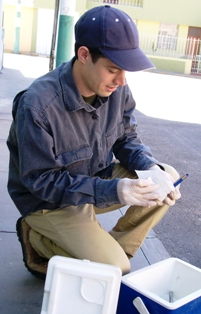Nets could help quash Chagas disease
September - October, 2008 | Volume 7, Issue 5
Fogarty researchers have found that insecticide-treated netting can dramatically slow the spread of bugs that carry Chagas disease, a chronic and potentially fatal infection that puts 25 percent of Latin Americans at risk.

Fogarty scientist Dr. Michael Levy
puts bugs in a cooler in Arequipa,
Peru, to preserve them for later
lab examination in a project
to fight Chagas disease.
It is the first time that netting has been shown to be effective against Chagas, say the authors of a study in the October issue of The American Journal of Tropical Medicine and Hygiene.
Lead author Dr. Michael Z. Levy, a Fogarty postdoctoral fellow, and senior scientist Dr. F. Ellis McKenzie, set up an experiment in a crowded neighborhood of Arequipa, Peru, in which the guinea pigs were guinea pigs.
The rodent is a staple of Peruvian food production and a common host for the parasite.
They determined that almost five times as many of the bloodsucking Chagas-carrying bugs Triatoma infestans were kept out of cages with insecticide-treated nets placed over them than in cages without nets, where the researchers placed bricks that attract the insects.
"Insecticide-treated nets have been shown to be effective in malaria control and potentially in the control of leishmaniasis," the authors said. "Now we know that they may also be a valuable tool in the control of Chagas disease."
Impregnated Netting Slows Infestation by Triatoma infestans. Michael Z. Levy, Victor R. Quispe-Machaca, Jose L. Ylla-Velasquez, Lance A. Waller, Jean M. Richards, Bruno Rath, Katty Borrini-Mayori, Juan G. Cornejo del Carpio, Eleazar Cordova-Benzaquen, F. Bern. Am J Trop Med Hyg. 2008; 79:528-534.
To view Adobe PDF files,
download current, free accessible plug-ins from Adobe's website.